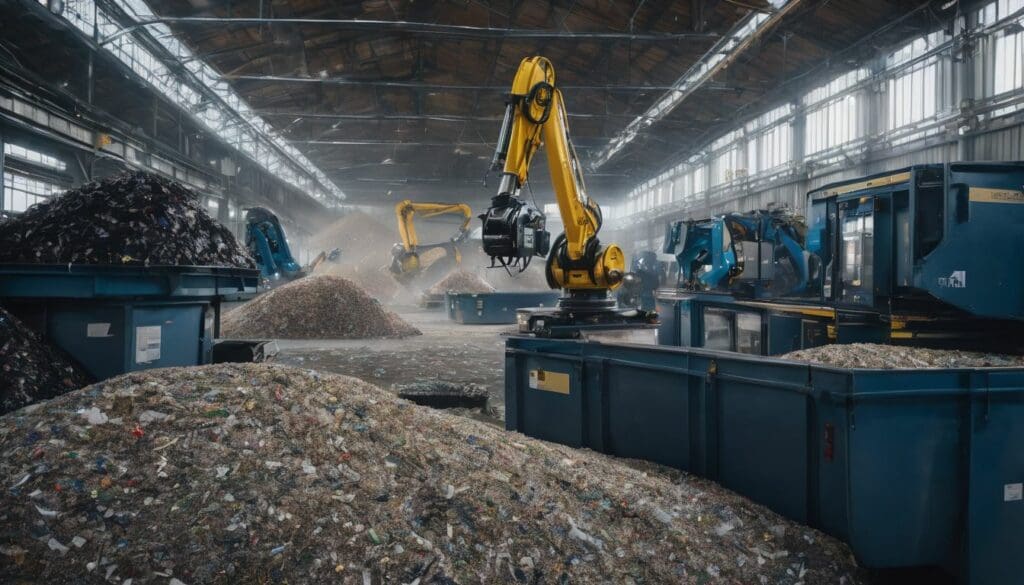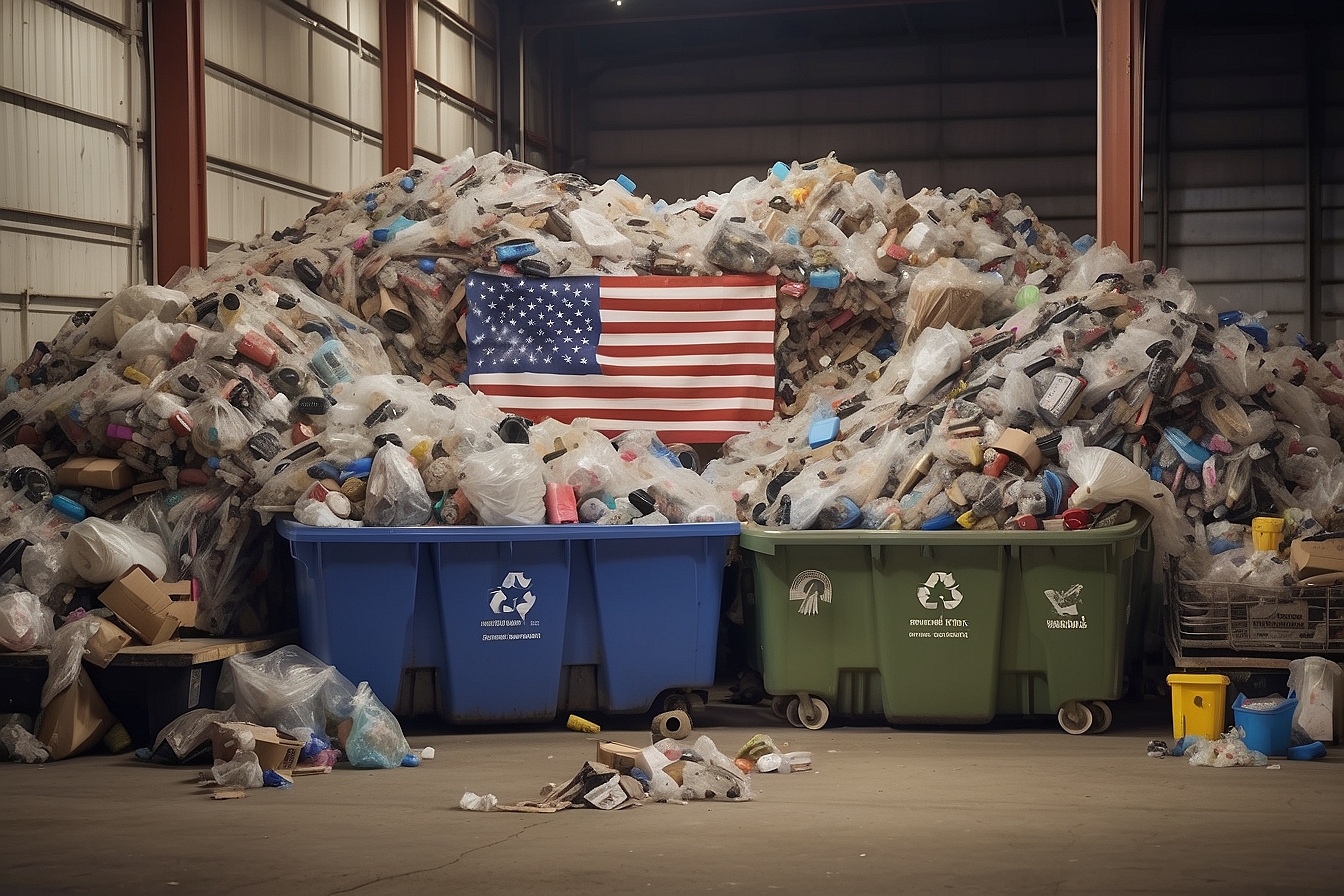Are you tired of seeing your garbage end up in landfills, polluting the environment and wasting valuable resources? We understand the frustration, as we’ve all experienced it too. Did you know that over 2 billion tons of municipal solid waste are generated annually worldwide? In this article, we’ll discuss how AI is transforming waste management and revolutionizing the way we handle our rubbish. Ready to learn about how technology can help us tackle this global issue?
Key Takeaways
- AI technology is pivotal in enhancing waste management by identifying different types of waste, optimising recycling processes and predicting waste patterns.
- Through AI’s advanced data analysis, collection routes are streamlined for efficiency, leading to energy and fuel savings as well as smarter resource use in the circular economy.
- Participation in recycling programmes powered by AI helps us contribute to a sustainable circular economy, where materials are continuously reused or recycled.
- Implementing AI – driven strategies in manufacturing can lead to notable reductions in material waste while also conserving resources for the future.
- The advancements of AI promise a more effective and user – friendly approach to waste management that encourages public participation and leads towards significant environmental improvements.
Definition of AI
Artificial Intelligence, or AI for short, is a game changer in tackling environmental challenges. It’s like having a smart assistant that can learn and make decisions without needing constant human guidance.
We’ve harnessed this technology to identify different types of waste materials efficiently, streamline recycling processes, and even predict patterns in waste generation.
By integrating AI into our sustainable practices, we’re optimising routes for collection trucks to save energy and fuel. It helps us design smarter systems within the circular economy where nothing goes to waste.
Robotics equipped with AI are revolutionising how we handle construction waste management too, ensuring resources are reused whenever possible. This smart approach not only supports conservation but also propels us toward truly renewable products and a healthier planet.
Importance of waste management
Having explored how artificial intelligence is shaping our future, let’s consider the critical role of effective waste management. It ensures environmental sustainability by reducing pollution and conserving natural resources.
We must manage solid waste smartly to minimise its impact on our planet. This means not just disposing of rubbish but rethinking how we reduce, reuse, and recycle materials.
Proper waste management is a cornerstone of smart cities, aiming for energy efficiency and resource conservation. Our efforts in sustainability are crucial as they directly influence public health, wildlife habitats, and global climate patterns.
By engaging with innovative waste disposal solutions and prioritising recycling, we contribute to a more sustainable circular economy that benefits everyone.
AI in Waste Management
AI plays a crucial role in waste management by facilitating waste sorting, processing and recycling, as well as route optimisation for collection and disposal. To learn more about the impact of AI on waste management, keep reading!
https://www.youtube.com/watch?v=xl_wjMdgYrY
Waste sorting and processing
- AI processes vast amounts of data to identify and categorise different types of waste accurately.
- This optimises the sorting process, ensuring that materials like plastic, glass, paper, and metal are separated efficiently.
- The use of AI enables route optimisation for waste collection vehicles based on real-time data.
- By enhancing the efficiency of waste sorting and processing, AI contributes to the overall goal of reducing environmental impact through effective solid waste management.
Recycling and circular economy
When waste is sorted and processed efficiently, it paves the way for a robust recycling system and circular economy. It’s crucial to promote the reuse of materials and products to minimise waste generation as well as conserve natural resources.
By actively participating in recycling programmes and supporting sustainable practices, we contribute towards creating a closed-loop system where materials are reused, remanufactured, or recycled into new products.
This proactive approach not only reduces the burden on landfills but also encourages a more sustainable and environmentally friendly way of living.
In embracing recycling and circular economy principles, we play an active role in reducing our ecological footprint while promoting responsible consumption and production patterns.
Waste reduction and minimisation
To achieve waste reduction and minimisation, we implement strategies such as reducing single-use products, reusing items where possible, and ensuring proper disposal of waste. By using AI technology to analyse consumption patterns and identify areas for improvement, we can make informed decisions to reduce waste generation.
Additionally, AI algorithms can optimise manufacturing processes to minimise material usage and decrease the amount of waste produced. This proactive approach not only reduces environmental impact but also saves resources in the long run.
The involvement of individuals and businesses is crucial in implementing these practices effectively for a sustainable future.
Public engagement
We can all play a crucial role in waste management by actively engaging with AI technology. Embracing smart waste bins and recycling apps allows us to make informed decisions about our waste disposal.
By participating in community clean-up efforts and educational campaigns, we contribute to the collective effort of reducing, reusing, and recycling. Encouraging others to adopt eco-friendly habits creates a ripple effect that positively impacts the environment.
As environmentally conscious individuals supporting conservation and environmental sustainability, harnessing the power of AI in waste management becomes an essential part of our daily lives.
The Future of AI in Waste Management
AI holds tremendous potential for revolutionising waste management in the future. Innovations in AI technology are anticipated to enhance waste sorting processes, enabling more efficient and accurate classification of recyclables and non-recyclables.
This can significantly contribute to promoting recycling and the circular economy, reducing the amount of waste that ends up in landfills or incinerators. Moreover, AI has the capability to facilitate real-time monitoring and analysis of waste generation patterns, paving the way for predictive modelling to optimise waste collection routes and schedules.
Furthermore, as AI continues to advance, we can expect increased automation in waste reduction processes through smart bins that can sort and compress trash more effectively. These technological advancements will not only streamline operational processes but also make it easier for individuals to engage with sustainable practices by providing user-friendly interfaces for disposal guidance.
Overall, the integration of AI into waste management systems holds promise for creating a more sustainable environment by maximising resource recovery while minimising environmental impact.
Conclusion
In conclusion, AI plays a crucial role in waste management. It streamlines waste sorting and processing, boosts recycling efforts, and reduces waste generation. Public engagement also benefits from AI applications, fostering greater environmental consciousness.
The future of AI in waste management looks promising as it continues to drive sustainable solutions for a cleaner planet.
FAQs
1. What does AI do in waste management?
AI in waste management helps to sort recyclable materials from rubbish and optimises routes for collection trucks, making the process quicker and more efficient.
2. Can AI improve recycling rates?
Yes, by using smart systems, AI can identify different types of waste for better sorting which can greatly improve recycling rates.
3. How does AI benefit waste collection services?
AI aids waste collection services by predicting the best times to collect bins and by planning the most fuel-efficient routes.
4. Will AI replace human jobs in waste management?
No, instead of replacing humans, AI is there to assist workers in managing tasks faster and safer while also reducing errors in sorting recyclables from general waste.





